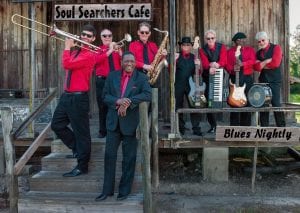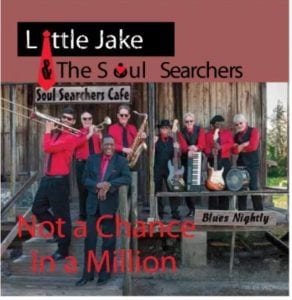October 17, 2019 | By Eric Snider
The story of two septugenarian musicians — one black, one white — who traveled parallel paths on the black nightclub circuit and are now partners in their own band
October 26
The Palladium Theater
Details here

They were born three months apart in 1944.
The vocalist, Little Jake Mitchell, an African-American who grew up poor in West Tampa, was a prodigy who started winning talent contests at age five, opened shows in his teens for the likes of James Brown and B.B. King, and graduated from all-black Lincoln High School in Gainesville.
The Caucasian-American saxophonist, Charles “Charlie Blade” Steadham, who grew up poor in a converted Army barracks a few miles south of downtown Gainesville, was a late bloomer who switched from clarinet to saxophone after graduating from all-white Gainesville High School. Each of them, the star and the sideman, spent a good portion of their formative years performing on the vibrant “chitlin circuit” of African-American nightclubs that dotted the United States until the early 1970s.
For the last 10 years, Mitchell and Steadham have led the eight-piece R&B band Little Jake & The Soul Searchers. Little Jake — who at 75 still possesses a powerful, rangy voice — fronts the group with youthful verve. Charlie Blade, also 75, directs the group as part of a three-man horn section, books the gigs and manages Mitchell’s career.
The tandem forms a remarkable, serendipitous partnership of two durable soul survivors. They are talking by speakerphone from the downtown Gainesville office of Steadham’s Blade Agency, an entertainment booking company he has owned and run for 40 years.
“When Mr. Mitchell talked me into getting my horn out of the closet, we decided that if we couldn’t do it the old-school way we weren’t interested in doing it,” Steadham says. That meant employing a sax/trumpet/trombone horn section, plus drums, bass, keyboards and guitar. “We wanted to make a presentation as if you were in one of those chitlin circuit clubs seeing a show band.”
That they do. Little Jake & The Soul Searchers play a bevy of familiar R&B classics — “Who’s Making Love,” “Lonely Teardrops,” “634-5789,” “Don’t Let the Green Grass Fool You” — along with the minor hits that Mitchell notched in the late 1960s under the stage name Jock Mitchell: “Not a Chance in a Million,” “No Mad Woman” and a handful of others.

The ensemble whips up a party. Little Jake saunters the stage in a flashy suit. His robust tenor still delivers spine-tingling soul shouts and wails. The backing band, clad in matching black-and-red outfits with white ties, lays down a rock-solid rhythm-and-blues foundation, be it bouncy shuffles, simmering ballads or funky throwdowns.
The road warrior days of their youth are long past. “We try to work a couple weekends a month,” Steadham says. “It usually takes me two days to recover from a show.”
Little Jake chuckles in agreement.
Both musicians attribute much of their longevity to clean living. “B.B. King told me when I was just a kid, ‘Jake, you take care of that voice,’” Mitchell recalls. “I followed that advice. I didn’t mess with no drugs and all that.”
• • •
Jake Mitchell and Charles Steadham were not friends in high school. It was nigh impossible in the early 1960s.
Mitchell grew up near the corner of Albany Avenue and Chestnut Street in what is now Old West Tampa. From the age of five, he regularly won singing contests sponsored by the Holsum Bread Company, for which he was paid in bread. “Tampa was a good city in those days,” Mitchell says. “It didn’t have all the violence. Italians, Cubans and blacks lived in the same areas and almost everyone got along good.”

One day, Jake was hanging around Sweetwater Poultry Market, singing as usual, when the owner, Henry Urso, heard him over the phone, rushed to the shop and signed the young phenom to a management deal. The kid fronted several bands in the Tampa Bay area, including the popular Doc’s Skyliners. Even though he was well under-age, Mitchell says, “I used to play all the bars, go in there and sing. Never had no problems whatsoever.”
In 1957, Jake attended a concert by one of his heroes, B.B King, at Plant High School. The blues star was aware of the teenaged talent and invited him onstage. That led to Jake joining King on the road for a few weeks.
Subsequently, other renowned artists such as Jackie Wilson and Sam Cooke would come into Tampa, feature Little Jake in their shows and often take him along for a leg of their tour. “My manager would provide a private tutor during my school years,” Little Jake says. “I did 20 dates with James Brown. He was hard on his band, but he was all right with me. One time he said, ‘Boy, you tryin’ to take my job, ain’t ya?’”
Mitchell arrived in Gainesville in 1959 and soon formed a band called Little Jake and the Blenders that played blacks-only nightclubs as well as white fraternity and sorority houses at University of Florida. The following year he made history. Little Jake and the Blenders had developed such a following that they were invited to perform at Gator Growl. Despite his tender years, Mitchell, aware that Gator Growl was a whites-only event, insisted that African-Americans be admitted.
The administration relented and set up 10,000 bleacher seats for blacks in the south end zone of Florida Field. “No one paid any attention to that,” Mitchell recalls. “Everyone started sitting everywhere and everybody was happy.”
Little Jake Mitchell had integrated UF’s signature homecoming event. A half-century later, after the singer had moved back to Gainesville, the city proclaimed May 6, 2010 as Little Jake Day.
• • •
Charles Steadham was born at Camp Lejeune in North Carolina and, at just a few months old, was moved to Gainesville after his father, a U.S. Marine, shipped out to the Pacific during WWII. “I was raised poor but proud in a hard-working, caring family with fair-minded, ethical parents,” he says. “I rode the school bus to school.”

By the time he graduated from Gainesville High in ’62, he was — like most every other kid around — a fan of Little Jake and the Blenders. Steadham ditched his clarinet, bought an $80 alto saxophone and started “learning my way around the horn.” While working toward an accounting degree at UF, he took in a jam session at Sarah’s Place in the black section of town. He didn’t dare sit in. “I watched for a year,” Steadham says with a chuckle. “I’d go home and practice, come back and watch. Finally, I got brave enough to ask if I could sit in. Little Jake was more of a star and I was a wet-behind-the-ears beginner.”
Steadham reckons he and Little Jake “first ran into each other in 1963 at Sarah’s Place. Little Jake and the Blenders played there a lot.” Mitchell recalls Steadham sitting in with the band on alto sax. For his part, Steadham has no clear memory of it. In any case, the two knew each other, but just casually.
Steadham says he dropped out of college one trimester short of an accounting degree to join a band called Lavell Kamma & The 100 Hour Counts. “Back then, there was no social media and bands had to build a rep,” Steadham says, explaining the group’s unusual moniker. “They got their name by playing 104 consecutive hours without stopping at a nightclub in Fort Lauderdale.”
Thus began Charles Steadham’s 13-year odyssey working on the African-American chitlin circuit, where his skin tone was exceedingly rare. He performed mostly in Florida, occasionally at big venues but largely in second- and third-tier clubs. In 1969, he formed his own band, Weston Prim & Blacklash (with the lead singer’s name out front) and barnstormed on a bus. “We’d play ’til 2 a.m., break down, get on the bus at 3 a.m. and ride to the next town, usually get in at 6:30, 7 in the morning,” he explains. “We had bunk beds on the bus. It was a little challenging to find a hotel that would take an integrated band. You wanted to be in the parking lot because the club’s house man would usually come by and you could get something to eat.”
Regional bands on the circuit worked for whatever was collected at the door. The price of admission was, Steadham remembers, “$2, $1.50 a head, sometimes 99 cents. By the time we covered expenses and divvied it up between 10 people, we were lucky to have $20 in our pockets.”
Despite the cheap ticket prices (a dollar in 1965 is worth about eight bucks today), some patrons would try to beat the system. “Back then there was a tradition that when the band took a break, they’d cut the price at the door,” Steadham recalls. “Some customers, mostly men, would wait outside for the band to take a break, then come off the hip with that money. So what we would do was play three solid hours, take a 30-minute break, come back and do a quick, 30-minute tag set.”
The band could beat the system, too.
• • •
Meanwhile, Little Jake’s chitlin circuit experience found him usually headlining the bigger, nicer rooms, traveling throughout the South and to major markets like Chicago, St. Louis, Kansas City, Philadelphia and New York, where he played the famed Apollo Theater in Harlem. He recalls headlining several dates at the Manhattan Casino on 22nd Street in St. Petersburg, which at the time was the city’s bustling nexus of black culture.
Not that it was all high times for Little Jake. He played his share of sketchy joints, too. “It was very educational,” he says wryly. “Sometimes you wouldn’t get your money. The promoter would be gone and the money was gone, too.”
Little Jake and Charlie Blade never toured together. “Mr. Mitchell and I would have passed in the night.” Steadham says.

In ’65, Little Jake settled in Detroit, where he cut “Not a Chance in a Million” for the independent Impact label, which specialized in white pop and garage-rock acts (including an early incarnation of Mitch Ryder & The Detroit Wheels) . The single notched minimal regional success, but did reach No. 8 on U.K. pop charts. To this day, the name Jock Mitchell (which is how he’s credited on the record) is still revered by British R&B aficionados.
He formed his own record label, Golden Hit Productions, with Sidney Barnes, who was business partners with future funk maven George Clinton. They cut a few songs by James Barnes & The Agents, of which “Free at Last (Great Day A-Comin)” earned a smidgen of attention.
As the ’70s progressed and the chitlin circuit faded, times got tough for touring R&B acts that weren’t on a major label. Steadham returned to Gainesville and opened his booking agency. Little Jake went an entirely different route. An accomplished cook, he landed a job at University of Bridgeport in Connecticut and rose to executive chef, a job he held for close to 20 years. He didn’t take music gigs during that period.
After returning to Gainesville in the late 1990s, Little Jake got the itch to sing again. “It didn’t take me long to get back in shape because I love to sing and didn’t have any of those bad habits,” he says. He did guest vocals with veteran regional bluesman Sarasota Slim for several years. Then he set about putting together his own unit, and contacted Steadham. “We did not stay in touch when we went on the road [as young men],” Steadham says. “But we always knew of each other. I stayed in Gainesville and had my agency and when he came back he looked me up.”
It took some persuading, but Steadham decided to dust off his horns — which now include tenor sax and a bit of baritone. “The horn line is moving all the time, running in place,” he says. “But the hardest part is the drive to get to the gig and especially the drive back home.”
All of the Soul Searchers save Steadham work in other bands. Although the group doesn’t perform on a regular schedule, they hold once-weekly rehearsals to keep sharp and ready for any suitable gig that comes their way.
Neither Mitchell nor Steadham has any immediate plans to hang it up. “Nah, I’ll do it as long as I can do it,” Little Jake says offhandedly. “I’m at the stage now where I can’t determine when that’ll happen. So we just keep on goin’.”




